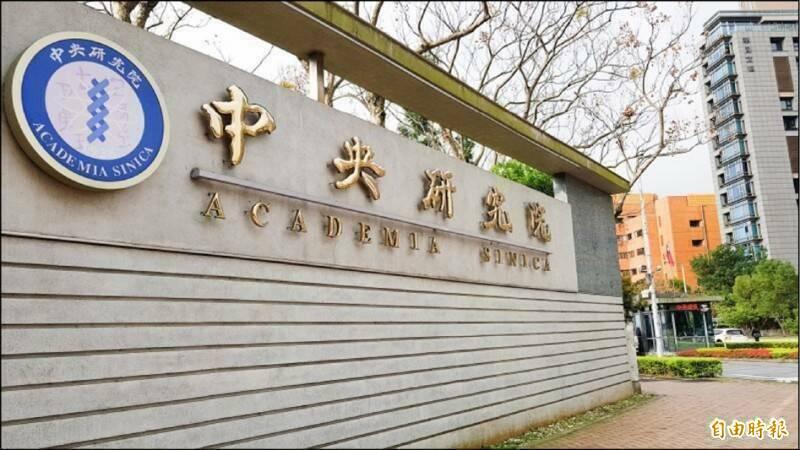Two former members of Academia Sinica were indicted for defrauding the institute of more than NT$34.8 million (US$1.12 million) using fake documents and purchases, Shilin prosecutors said yesterday.
The prosecutors charged the two people with fraud and 12 others with falsifying quotations and receipts, and asked for their illicit gains to be confiscated, the Shilin District Prosecutors' Office said in a statement.
From 2019 to 2020, one of the former researchers, surnamed Chang (張), bought equipment for his own tech company from 11 manufacturers, but had the purchases quoted as made by his Academia Sinica lab, prosecutors said.

Photo: Taipei Times
He then instructed a fellow researcher and company shareholder, surnamed Chi (紀), to submit reimbursement claims to Academia Sinica, defrauding the institute of more than NT$18.83 million, the statement said.
Prosecutors said that in 2019, Chang's company won six Academia Sinica procurement bids worth more than NT$15.89 million, but the institute never kept the items it paid for as Chi, who oversaw lab purchases, sent them back to Chang's firm after delivery and inspection.
In addition, from 2019 to 2021, Chang allegedly used Academia Sinica to dispose of his company's battery cell waste by passing it off as lab waste, costing the institute more than NT$70,000, prosecutors said.
Prosecutors urged heavy sentences for Chang and Chi, citing the scale of the financial fraud, the statement said.
Academia Sinica’s Institute of Physics said in a statement yesterday that the two people involved were not “researchers” as reported by local media.
One of them was a former contract staff and the other person was a visiting academic, the statement said.
The term “researcher” is used to refer to full professors and staff members of the same rank, it said.
It is regrettable that the two were involved in this case, the statement said.
The institute said it has been fully cooperating with investigators and would carry out necessary measures to prevent similar events from happening again.
Additional reporting by Yang Yuan-ting and Fion Khan

Three batches of banana sauce imported from the Philippines were intercepted at the border after they were found to contain the banned industrial dye Orange G, the Food and Drug Administration (FDA) said yesterday. From today through Sept. 2 next year, all seasoning sauces from the Philippines are to be subject to the FDA’s strictest border inspection, meaning 100 percent testing for illegal dyes before entry is allowed, it said in a statement. Orange G is an industrial coloring agent that is not permitted for food use in Taiwan or internationally, said Cheng Wei-chih (鄭維智), head of the FDA’s Northern Center for

LOOKING NORTH: The base would enhance the military’s awareness of activities in the Bashi Channel, which China Coast Guard ships have been frequenting, an expert said The Philippine Navy on Thursday last week inaugurated a forward operating base in the country’s northern most province of Batanes, which at 185km from Taiwan would be strategically important in a military conflict in the Taiwan Strait. The Philippine Daily Inquirer quoted Northern Luzon Command Commander Lieutenant General Fernyl Buca as saying that the base in Mahatao would bolster the country’s northern defenses and response capabilities. The base is also a response to the “irregular presence this month of armed” of China Coast Guard vessels frequenting the Bashi Channel in the Luzon Strait just south of Taiwan, the paper reported, citing a

UNDER PRESSURE: The report cited numerous events that have happened this year to show increased coercion from China, such as military drills and legal threats The Chinese Communist Party (CCP) aims to reinforce its “one China” principle and the idea that Taiwan belongs to the People’s Republic of China by hosting celebratory events this year for the 80th anniversary of the end of World War II, the “retrocession” of Taiwan and the establishment of the UN, the Mainland Affairs Council (MAC) said in its latest report to the Legislative Yuan. Taking advantage of the significant anniversaries, Chinese officials are attempting to assert China’s sovereignty over Taiwan through interviews with international news media and cross-strait exchange events, the report said. Beijing intends to reinforce its “one China” principle

A total lunar eclipse, an astronomical event often referred to as a “blood moon,” would be visible to sky watchers in Taiwan starting just before midnight on Sunday night, the Taipei Astronomical Museum said. The phenomenon is also called “blood moon” due to the reddish-orange hue it takes on as the Earth passes directly between the sun and the moon, completely blocking direct sunlight from reaching the lunar surface. The only light is refracted by the Earth’s atmosphere, and its red wavelengths are bent toward the moon, illuminating it in a dramatic crimson light. Describing the event as the most important astronomical phenomenon